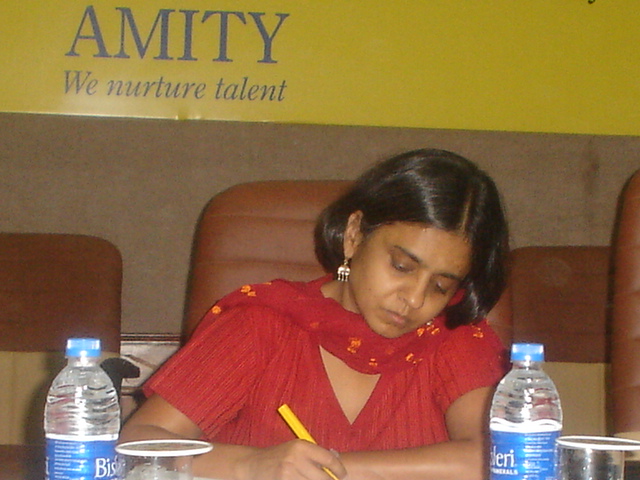23 Sep 2006|Noida | Amity Campus, Sector-125, Noida
National Multi-Stakeholder Workshop: Sustainable Forest Management in India” organized by Amity
 Amity School of Natural Resources & Sustainable Development under the guidance and support of Ministry of Environment & Forests, Government of India organized National Multi-Stakeholder Workshop: Sustainable Forest Management in India during the visit of International Tropical Timber Organization (ITTO) DIAGNOSTIC / TECHNICAL MISSION TO INDIA at Amity Campus, Noida.
Amity School of Natural Resources & Sustainable Development under the guidance and support of Ministry of Environment & Forests, Government of India organized National Multi-Stakeholder Workshop: Sustainable Forest Management in India during the visit of International Tropical Timber Organization (ITTO) DIAGNOSTIC / TECHNICAL MISSION TO INDIA at Amity Campus, Noida.
Inaugurating the workshop
Mr. Namo Narayan Meena, IPS, Hon’ble Minister of State Environment and Forests, Govt. of India and Chief Guest of the occasion said his ministry, "within its limited means", has embarked upon an ambitious plan on greening up the degraded forests through participation of local communities especially the weaker sections of society under the National Afforestation Programme. The restoration and management of such degraded and secondary forests have to be based on the needs and requirements of all the stakeholders. These degraded forests have to be developed as multiple-use forests and their environmental and socio-cultural benefits have to be fully recognized”. He spoke on India’s perspective and future strategy for conservation and utilization of tropical forests and linkages with international agencies.
Guest of Honour on the occasion
Prof. M.S. Swaminathan, Chairman, National Commission on Farmers, Father of Green Revolution in India and greatest agricultural scientists in Indian History. He talked about International dialogue and cooperation in field of agroforestry, sustainable forestry practices, development of new technology and farmers as stakeholders in the forestry sector. He said, “Environmental impacts of harvesting non-wood forest products (NWFPs) and the recreational uses of forests have so far been assessed less than timber harvesting. While activities such as ecotourism and harvesting of NWFPs are considered inherently benign, studies have shown that these activities can have serious environmental impacts when devoid of careful planning and management. Unplanned harvest of NWFPs without adequate knowledge about their resource base, appropriate tools and techniques to be used, the regenerative capacity of species, their silvicultural requirements, the seasonal variations in productivity and the local subsistence demands, can result in severe environmental damages”.
Dr. Ashok K. Chauhan, Founder President, Ritnand Balved Education (RBEF) said, “Human impact on the natural resources is the core area of future science and technology development. The entire globe is more technology savvy but the environment today has taken a back seat and attention needs to be devoted to afforestation and land-use change, urban ecology, invasions, biodiversity loss, and interacting drivers of global change. Taken together, the resounding message is focused on human footprint on the land and waterscapes across globe and what can be done to understand and mitigate this impact in future. It has become clear that, as we think about the future impact of global change, one of the largest uncertainties is how these anthropogenic changes will interact and affect ecological processes. It is important to link ecological knowledge with economic sides for optimum land-use change and sustainable development”.
Dr. Maharaj K. Muthoo, Mission Leader, ITTO Diagnostic Mission gave brief layout on ITTO. He quoted, “International Tropical Timber Organization (ITTO) was established under the auspices of United Nations in 1986 amidst increasing worldwide concern for the fate of tropical forests. ITTO is an intergovernmental organization promoting the conservation and sustainable management, use and trade of tropical forest resources. Its 59 member countries represent about 80 per cent of the world's tropical forests and 90 per cent of the global tropical timber trade. In 1990, ITTO members agreed to strive for an International Trade of Tropical Timber from sustainably managed forests by the century's